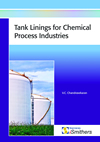Tank Linings for Chemical Process Industries

Rubber linings can be used as passive protection against the corrosion of plant and equipment in the chemical process industries. Rubbers act as sacrificial materials reacting or un-reacting with the corrosive media, diffusing the liquids or not diffusing, swelling by itself or not swelling, permeating or not permeating gases or fumes, abrading or wearing by the slurry particles, getting ozonised or oxidised; but still protecting the metal surface beneath it, during its considerable life cycle under those severe and stressed conditions. Rubbers age but their life cycle is good enough to protect the metals against corrosion and erosion.
The raw material bases are natural or synthetic rubbers. Rubber is used for corrosion/abrasion proof linings, more than any other material because of its proven superiority in this service at a relatively low cost. Fertilizer, electroplating, ore-refining, petrochemicals, chlor-alkali and paper industries invariably turn to rubber linings, in preference to other types of linings for their high resistance to corrosion and abrasion. Moreover the variety of rubbers, both natural and man-made, available and its flexibility to serve under wide temperature and pressure ranges, made rubber linings as the world-wide accepted anti-corrosive and anti-abrasive media.
This book describes exactly how to use rubber as a lining in tanks and how to overcome problems associated with this technique.
Click here for further information.
Terms
While we only use edited and approved content for Azthena
answers, it may on occasions provide incorrect responses.
Please confirm any data provided with the related suppliers or
authors. We do not provide medical advice, if you search for
medical information you must always consult a medical
professional before acting on any information provided.
Your questions, but not your email details will be shared with
OpenAI and retained for 30 days in accordance with their
privacy principles.
Please do not ask questions that use sensitive or confidential
information.
Read the full Terms & Conditions.